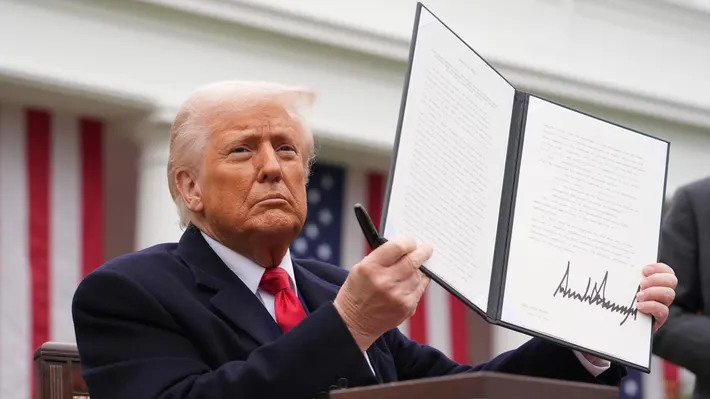
In a major legal setback for former President Donald Trump’s economic agenda, a U.S. federal appeals court has ruled that the sweeping global tariffs imposed under his administration are illegal. The ruling, delivered on August 30, 2025, could reshape America’s trade landscape and deal a serious blow to one of Trump’s signature policy tools in his second term.
The U.S. Court of Appeals for the Federal Circuit concluded that the Trump administration’s reliance on the International Emergency Economic Powers Act (IEEPA) to justify tariffs on more than 70 countries exceeded the law’s authority. The decision marks the second time this year that a federal court has determined the tariffs were unlawful, following a lower court ruling in May.
A Blow to Trump’s Trade Strategy
Since returning to the White House, Trump has aggressively used tariffs as leverage in global trade negotiations. His administration rolled out duties of 15%, 20%, and in some cases as high as 50% on imports from countries including Brazil, India, and several European nations. Trump argued that the measures were necessary to protect American jobs and industries, framing them as a defense of U.S. sovereignty against unfair trade practices.
But the appeals court found that invoking emergency powers under IEEPA did not give the president unlimited authority to apply tariffs across the board. Instead, the law was designed for narrow and targeted actions, not broad economic measures.
“This ruling makes clear that the government’s reliance on emergency powers to justify sweeping tariffs does not hold up under the law,” said Brian Chung, NBC’s business correspondent, while reviewing the court documents.
What the Ruling Covers—and What It Doesn’t
The decision applies specifically to Trump’s “reciprocal” global tariffs, where each country was assigned a different tariff rate. However, not all tariffs currently in place are affected. Duties on steel, aluminum, semiconductors, and smartphones—implemented under separate statutes such as Section 232 of the Trade Expansion Act—remain legal and outside the scope of this case.
That distinction is crucial, as industries like steel and aluminum remain at the center of Trump’s protectionist agenda. The ruling does not touch those measures, but it does undermine a broader strategy that Trump hoped to expand.
What Happens Next?
The White House has not yet issued an official response to the ruling, despite multiple requests for comment. However, legal experts and political analysts widely expect the administration to appeal to the Supreme Court.
“This is not the final word,” said Yamiche Alcindor, reporting from the White House. “Trump has made tariffs a political and economic hallmark. He is not going to walk away quietly from this decision.”
The plaintiffs in the case include small U.S. businesses who argued that the tariffs imposed heavy financial burdens and disrupted supply chains. One of the lead challengers, a small importer named VOS, framed the fight as a battle for survival. Their success in court highlights how smaller firms, often overshadowed by major corporations, can mount significant legal challenges against government policy.
Political Fallout
Beyond the legal arena, the ruling is a political setback for Trump. He has spent months touting tariffs as proof of his commitment to “America First” policies, using trade wars as a centerpiece of his campaign rhetoric and governing strategy.
If the Supreme Court ultimately upholds the lower courts’ rulings, Trump could lose one of his most powerful economic tools. That would not only affect his credibility with voters who support tough trade measures but also potentially reshape negotiations with foreign governments.
The decision also complicates Trump’s ongoing efforts to expand tariffs further. In recent speeches, he has floated new duties on electronics, pharmaceuticals, and energy imports. Without legal backing, those proposals could face swift challenges in court.
A Divided Judiciary, But Broad Consensus
Interestingly, the appeals court panel that issued the ruling included judges appointed by both Republican and Democratic presidents, undermining Trump’s frequent claims that judicial decisions against him are politically motivated. Appointees from the Clinton, Bush, and Obama administrations were all part of the decision.
Legal analysts say that bipartisan composition may make it harder for Trump to argue that the ruling was purely partisan.
Global and Economic Implications
If the tariffs are ultimately struck down, it could have significant global trade implications. Countries that have been locked in disputes with Washington—such as Brazil and India—would likely welcome the decision, seeing it as a rollback of what they viewed as punitive and arbitrary trade measures.
For American consumers and businesses, the removal of tariffs could lower costs on imported goods, from electronics to agricultural products. However, industries that have benefited from tariff protection, like U.S. steel and aluminum producers, may see the decision as a threat to their competitive advantage.
Business and Voter Reactions
The appeals court ruling is already reverberating outside Washington. Small and mid-sized businesses that have struggled with higher import costs welcomed the decision as a lifeline. “These tariffs nearly put us out of business,” one importer told reporters, adding that supply chains could finally start to stabilize if the ruling stands.
On the political front, Trump’s supporters view the tariffs as a symbol of economic toughness, while critics argue they have damaged U.S. competitiveness. With the 2026 midterm elections looming, the issue could become a flashpoint for voters concerned about the cost of living and America’s role in global trade.







2 thoughts on “U.S. Appeals Court Rules Trump’s Global Tariffs Illegal in Landmark Decision”